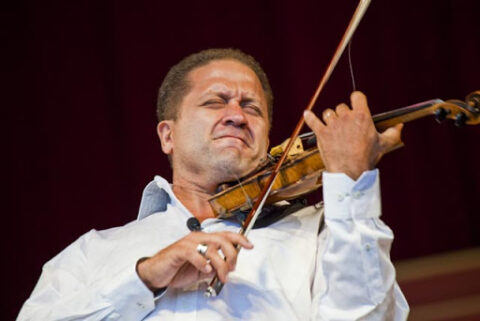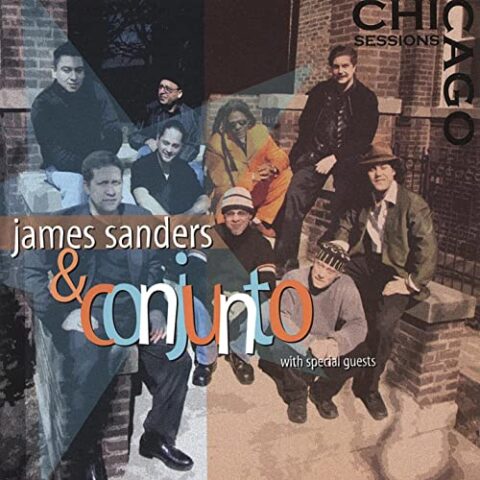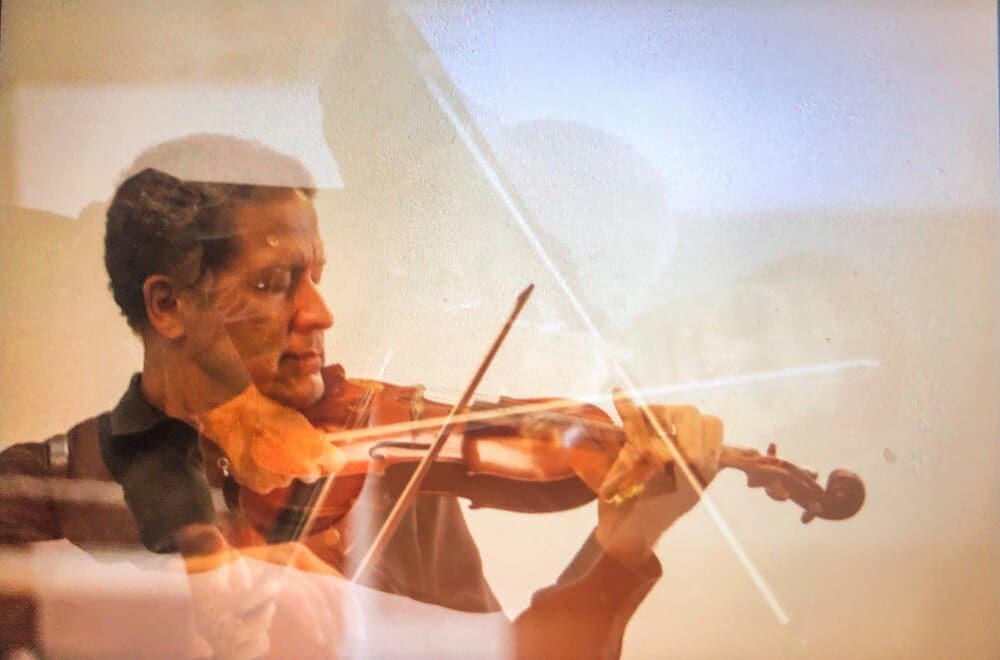Chicago-born-and-based violinist James Sanders has drawn inspiration from his mother’s Dominican heritage along with his classical pedigree to create a career with myriad successes in the jazz and orchestral worlds. Since 2019, he has been a mentor with the Chicago Musical Pathways Initiative.
“Being a Latino, being mixed, I’ve always been able to fit into different situations – like a chameleon,” said Sanders, from his home studio during a recent interview via Zoom. “I could fit into different situations, and I learned all these different rules of engagement.”
For example, Sanders noticed early on that people from different cultures communicated differently. “In some circles, a certain amount of physical distance was important. Yet, in another circle, that could otherwise be considered phony or pretentious by different cultures.” Sanders, a 28-year member of the Chicago Sinfonietta, was shaped by these experiences from an early age.
As a graduate of Lane Tech High School in Chicago’s Roscoe Village, Sanders realized during his freshman year that he was interested in a career as a professional musician. “When I was in high school, you were expected to declare a major early on. According to Lane Tech alumni, during the 1950’s it was harder to get into the school’s top orchestra than it was to get into the Civic Orchestra,” the Chicago Symphony Orchestra’s storied training ensemble. One of Sanders’s primary teachers was Raymond Niwa, a 46-year member of the CSO’s violin section as well as a Lane Tech alumnus. “It was quite a legacy, and I got caught up in the magic of it all,” Sanders recalled.
Even in high school, though, Sanders had to negotiate differences between his family and the world of classical music. One summer, his mom wanted him to attend Interlochen Fine Arts camp. But Ray Niwa, his esteemed teacher, had other ideas.
“Ray got me on track with a steady diet of études and scales. Then he told my mom that I should skip summer camp and spend the summer with him, studying all day, every day. Just eating oatmeal and practicing,” recalled Sanders, laughing. The cultural divide between what Sanders’s mom had in mind and what his teacher had in mind would set the stage for many choices throughout his professional development.
After graduating from DePauw University, Sanders attended graduate school at Yale University, where he studied with former New York Philharmonic and CSO concertmaster Sidney Harth. “The experience was amazing; I couldn’t absorb enough of it!” said Sanders. But he quickly noticed that as he got into the higher levels of his profession, he was “expected to develop niches and specialties.”
“Sometimes I feel like where [classical artists] lose the connection with society and culture, is when these institutions become too specialized,” said Sanders, who worked tirelessly at Yale to take his musical refinement to the next level.

CMPI Mentor James Sanders | John Broughton Photography
“I was recently talking to an old school friend of mine, who’s in the Lyric Opera [Orchestra]. I mentioned to her that I would have loved to have gotten a job with an opera company when I was fresh out of school—that would’ve been great—but that didn’t happen. So, I did whatever I had to do to survive. Part of my need for artistic exploration as a musician was survival. I can play these parts, I can do these gigs, I can teach these kids some new music…but as long as I have control over things, I’m good. I like to roll together unique experiences into something that becomes food for my soul. That gets me excited.”
–CMPI Mentor James Sanders, on carving his own musical pathway
Sanders never thought that jazz would influence his career, even though the foundation was laid during college. “Two friends of mine—who were really good jazz players—encouraged me to join an improv class. I think they just thought it would be really funny to see me thrown in the deep end of the jazz world. I was totally in over my head!”
He now believes that experice planted a seed that would affect his future career ambitions. “I thought maybe, at some point, I would get better at it or try harder.” The only problem, as Sanders saw it, was that the traditionally insular “world of classical violin was so competitive, and there’s so much repertoire, that I never had the cognitive space to really commit to just jazz studies. Really, I was just trying to get better at playing the fiddle!”
Now, as a private teacher in the Arlington Heights school district and as a CMPI mentor, Sanders considers the depth and breadth of his students’ experiences. “I think you have to take into account the way a person’s culture affects the way you communicate with them and their family.” For Sanders, this includes how he addresses issues with families.
“With the kids that I’m mentoring, I really try to feel it out. One student I’m working with is so smart; he’s doing exactly what he needs to do, and doesn’t need me to tell him how to fill out college applications, because he’s doing it on his own. So, when we talk, we talk about if he is going to miss his family when he goes away to school. And he tells me that, ‘yeah, of course’ he will, he’s really close to them and it will be something to think about during the application process.”
“We all have something that we might need to talk about with someone else,” explained Sanders. “You just have to feel out that opening to have that conversation. You really must use your intuition as a mentor, and if there’s nothing that needs to be worked on, then it’s okay just to call and say ‘hey.’”
These conversations require finesse during the best of circumstances, let alone during the challenges presented by the current pandemic. But the quarantine has seen some positive results for Sanders and his students. “During this COVID-19 period, I’m probably the only one-on-one interaction that these students have. So, for some who may have only been marginally invested in lessons, they’ve really increased their attention. They’re going to online classes, where they’re one of 20 kids, but I’m the one guy who is there to actually listen to them. In that regard, the relationships with my students have actually deepened during this time.”
When asked what makes CMPI unique, Sanders didn’t hesitate to answer. “The job is about showing up for these kids, day after day. Being there for them so they know that there’s a community supporting them.” Sanders feels the weight of being “another voice telling them that what they are doing is important. We have no idea what kind of contributions these kids are going to make, they may not even know yet. But we’re here to support them.”

The album cover to “Chicago Sessions” by James Sanders & Conjunto
“You must come in contact with society at every opportunity possible. Here’s a perfect example of that: Five years ago, a man called and invited me to come play at a Jewish nursing home. I didn’t know what to expect when I arrived, but when I walked in there were a lot of people waiting for the recital in a big, atrium-like room. So, I played a couple movements of Bach sonatas and everyone was attentive and clapped. Then I started playing some showtunes, and all of a sudden, the audience started singing and swaying, and we all got really into this performance. Rogers and Hammerstein songs, ‘Dancing Cheek-to-Cheek,’ and other standards. The residents remembered the melodies and were transported back in time. It amazed me. I didn’t expect to be so moved by this gig at a nursing home. It’s these types of cross-cultural encounters where the magic happens. The arts connect in the most profound ways. It’s important to meet people wherever they are at.”
–CMPI Mentor James Sanders, on the importance of playing outside of your comfort zone and accepting new experiences.
On Monday, March 15, 2021 7:00 – 8:30 pm (CDT), James Sanders will present a free, virtual lecture at the Music Institute of Chicago. The program is called “Dark Angels of the Violin: Jazz legends Eddie South and Stuff Smith.” To learn more, visit https://www.musicinst.org/virtual-jazz-lecture-series.
By Benjamin C. Wise
TOP: CMPI Mentor James Sanders | Photo courtesy of Fulcrum Point New Music Project
